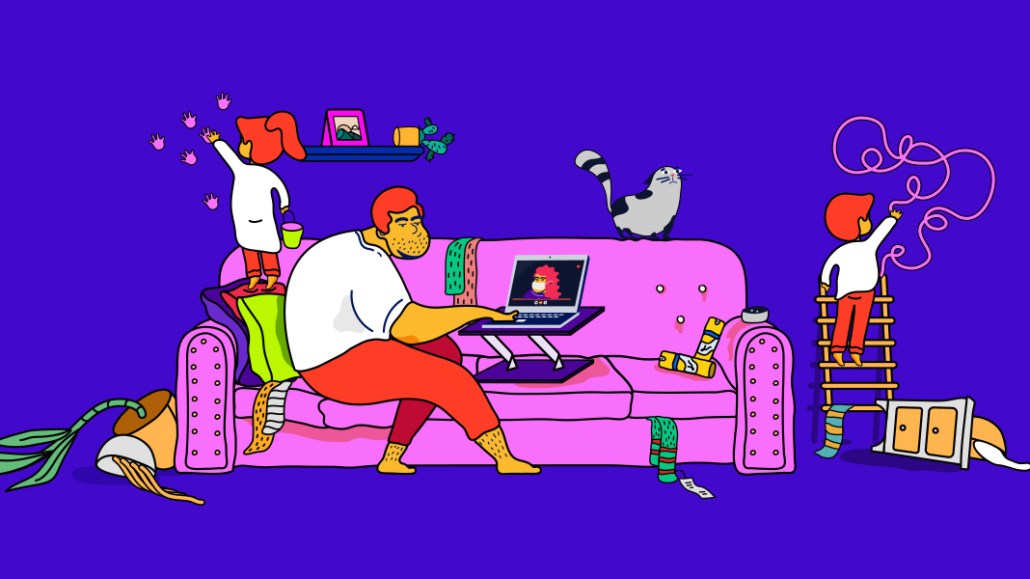Secure your place at the Digiday Media Buying Summit in Nashville, March 2-4
‘There’s huge cultural stigma around role of dads’: More men are requesting flexible working

U.K. chancellor Rishi Sunak no doubt thought he was saying the right thing when he thanked moms for “doing the enormously difficult job of juggling childcare and work at this tricky time.” But working parents nationwide were quick to express exactly what was wrong with Sunak’s words, with The Mirror newspaper calling it a “sexism row.”
“It sounded very much as if he was perpetuating the lazy assumption that women do the dishes and the childcare — while also contributing a few scrappy pennies to the family finances — leaving the guys free to focus on more lucrative, manly things like mastering the universe instead,” Channel 4 News presenter Cathy Newman wrote in The Independent.
While evidence around how the pandemic has impacted women’s careers should be taken seriously, there’s also a growing conversation around the increasingly active role of men in family life, how that contributes to gender equality and what that could look like in the workplace.
A snapshot “Dads in Lockdown” survey conducted by parenting website DaddiLife last May revealed that 70% of 116 dads who responded are doing more cleaning, 67% more cooking and 51% are involved in homeschooling. When asked what they would change post-lockdown, 32% of respondents said they want to spend more quality time with family, followed by 25% citing more flexible working and 19% remote working.
More men choosing to work flexibly is critical to close the gender pay gap and reach gender parity, said Cheney Hamilton, founder and CEO of flexible working website Find Your Flex. The site claims 47% of its visitors are male, with the public sector, technology and marketing and communications among the most popular industries. Similarly, That Works For Me flexible working website has reported its male membership base to have doubled over the past three months.
“Unfortunately, many flexible working opportunities are still predominantly targeted at women,” said Hamilton, adding that businesses seeking better gender parity should encourage men to feel comfortable applying for part-time roles as well. “Will 2021 see another year where female-led campaigns try to tackle the gender parity conversation, versus leaning in to male audiences and saying: ‘it’s not only OK to apply for our part-time roles, but it’s encouraged,’” she added.
It’s certainly a trend appearing across the advertising industry. HR leaders at RAPP U.K., AMV BBDO and Ogilvy report an uptick in more men making — and being granted — flexible working requests in varying forms since the pandemic hit.
“We’ve seen a big increase in male employees asking to have mornings or afternoons off for childcare or home-schooling, and we’ve been more than happy to give it to them,” said Kelly Knight, chief diversity and HR officer at AMV BBDO.
RAPP U.K.’s people director Laura Sherwood said an agency-wide survey last month of parents and carers showed the majority of new fathers in particular were looking for more opportunities to share childcare. “The changes our industry is making towards achieving it [gender parity] have been incremental, but the pandemic has certainly helped to accelerate buy-in and support for flexible work,” she said.
Ogilvy’s chief people officer Helen Matthews agrees the pandemic has normalized the conversation around flexible working, and that includes changing the narrative around it being the domain of women.
“There’s a massive opportunity, in terms of the impact on working mothers in particular — this could potentially be really good in the longer term, as we’ve now ripped the plaster off around flexible working,” she said.
DaddiLife founder Han-Son Lee, also planning director at RAPP London and a father of one who plans to go part-time at the agency, pointed to the website’s The Millennial Dad at Work research from 2019 to illustrate how far things have come, though he added that not everyone is not yet on the same page.
Before the pandemic, there was already a rise in fathers planning to pursue more flexible working options in order to better balance family life, but they were being denied by their organizations, according to Lee. “There’s still very much a huge cultural stigma around the role of dads and massive organizational barriers around how dads should be at work,” he added.
Finding ways to work through those barriers will benefit both genders. “Working moms can’t realize their full potential until we do that,” said Lee. “If we get this right, and if we can have more true equality conversations, that lead to actions and policies around how we enable a thriving family, that’s the opportunity of this pandemic. And this industry has a great opportunity to lead the way.”
More in Media

WTF is a creator capital market?
What is a creator capital market, what does it mean for creators looking to diversify revenue, and why is it so closely tied to crypto?

Media Briefing: Publishers explore selling AI visibility know-how to brands
Publishers are seeing an opportunity to sell their AI citation playbooks as a product to brand clients, to monetize their GEO insights.

Creators eye Snapchat as a reliable income alternative to TikTok and YouTube
Figuring out the Snapchat formula has been very lucrative for creators looking for more consistent revenue on a less-saturated platform.








